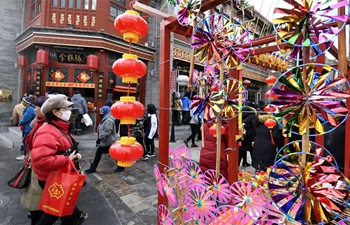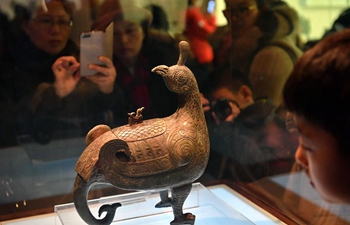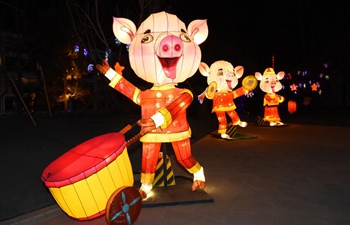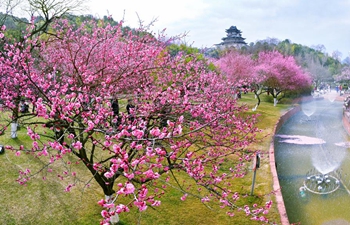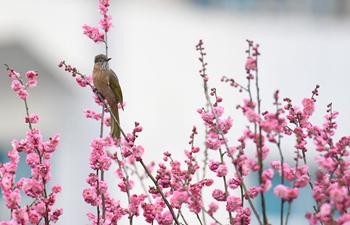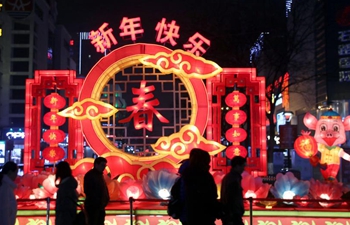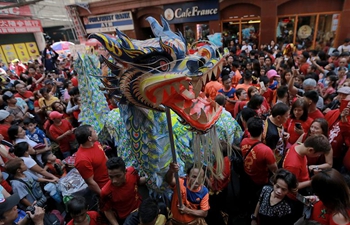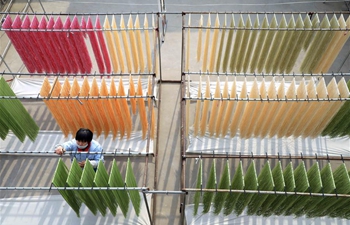
Students of the state boarding school of Tivoli recite the Three-Character Classic Chinese in Tivoli, Italy, Feb. 8, 2019. A thick crowd of Italian parents filled the Confucius Hall at the Convitto Nazionale in Tivoli on Friday evening, eager to see their children perform before teachers, local authorities, and Chinese representatives. (Xinhua/Cheng Tingting)
TIVOLI, Italy, Feb. 9 (Xinhua) -- A thick crowd of Italian parents filled the Confucius Hall at the Convitto Nazionale in Tivoli on Friday evening, eager to see their children perform before teachers, local authorities, and Chinese representatives.
The state boarding school of this ancient Roman town at the outskirts of the Italian capital was a key location for celebrating the Chinese Year of the Pig at regional level, and pupils of all age were meant to be in the spotlight.
Here, the Confucius didactic hall was inaugurated over four years ago, and the teaching of Chinese language and culture was even earlier introduced as curricular activity at all levels: primary, lower secondary school, and upper high school.
Thus, boys and girls were called to show how much they benefited from it so far, and followed one another on stage -- in groups or alone -- according to their age and class level.
Third grade students -- the youngest performers -- engaged in traditional Chinese dances, while their little older schoolmates from the primary tested their speaking skills with Chinese songs and stories.
Then, it was the turn of a couple of students introducing the audience to the notes written by a Chinese traveller in and around Rome back in 1623. One reading the original text, and the other translating in modern Italian. They gave voice to the wonder that filled that Chinese visitor before the ancient fountains, green gardens, and the overall beauty of Tivoli at the time.
Finally, all pupils together performed the Three-Character Classic Chinese song for children; and then, a short performance of Tai Chi martial art closed the proper show.
Education Councilor of the Chinese Embassy in Italy Luo Ping, and Chinese Director of Sapienza University Confucius Institute Zhang Hong were among the guests at the show, along with major representatives from Tivoli's local government and institutions.
"These celebrations for the Chinese New Year have been an opportunity to strengthen our friendship with Chinese cultural authorities, and to further improve the proficiency of our students," the dean of the Convitto, Antonio Manna, explained.
The teaching of the Chinese language was not only meant to boost the pupils' skills and culture at theoretical level, but also seen as a potential tool for their future professional life.
The Convitto's upper secondary school was in fact a vocational institute providing a degree in tourism business and hospitality. Counting at least on a basic understanding of the Chinese culture, and being able to speak to Chinese tourists to better meet their needs were now considered necessary.
And the last part of Tivoli's event was indeed devoted to the skills of the older students, who offered a light dinner with "multicultural" food receipts palatable for both Italian and Chinese customers.
"Food traditions are a crucial component of the overall culture of a country, and we Italians are very much aware of that," the dean told Xinhua.
"This is even more true for a country like China, and this buffet is proof of how much our high school students are aware of the relevance of having an educational path comprising the Chinese culture, and a multicultural approach in their professional career."
While parents and friends crowded around the tables in the evening -- seemingly enjoying the culinary choices of their kids -- younger children were busy practicing Chinese calligraphy with teachers and volunteers of the Confucius Institute.
That in Tivoli was one of the six Confucius Didactic Halls in the country that promote the Chinese teaching under the supervision of Sapienza University Confucius Institute in Rome, which was the first to be established in Italy in 2006.
This showed the Chinese didactical offer has developed and changed over the years, along with a growing demand from Italians of all ages, as the director explained.
"Italian students from other regions do not have to come to Rome to receive a high-quality Chinese teaching, they can now find it in the neighbourhood," Zhang told Xinhua.
This added to a growing number of Italian primary and secondary schools that have been introducing the teaching of Chinese as second or third foreign language across the country.
